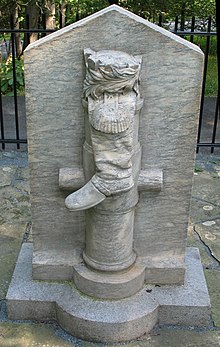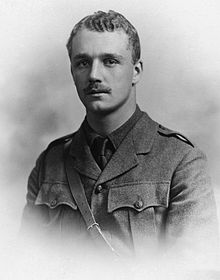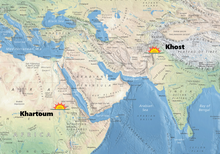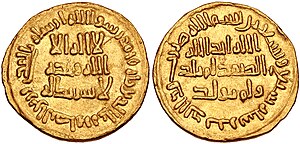Portal:History
The History Portal
History is the systematic study of the past. As an academic discipline, it analyzes and interprets evidence to construct narratives about what happened and explain why it happened, focusing primarily on the human past. Some theorists categorize history as a social science, while others see it as part of the humanities or consider it a hybrid discipline. Similar debates surround the purpose of history, for example, whether its main aim is theoretical, to uncover the truth, or practical, to learn lessons from the past. In a slightly different sense, the term history refers not to an academic field but to the past itself or to individual texts about the past.
History is a broad discipline encompassing many branches. Some focus on specific time periods, such as ancient history, while others concentrate on particular geographic regions, such as the history of Africa. Thematic categorizations include political history, social history, and economic history. Branches associated with specific research methods are quantitative history, comparative history, and oral history.
Historical research relies on primary and secondary sources to reconstruct past events and validate interpretations. Source criticism is used to evaluate these sources, assessing their authenticity, content, and reliability. Historians integrate the perspectives of several individual sources to develop a coherent narrative. Different schools of thought, such as positivism, the Annales school, Marxism, and postmodernism, have distinct methodological implications.
History emerged as a field of inquiry in the ancient period to replace myth-infused narratives, with influential early traditions originating in Greece, China, and later also in the Islamic world. Historical writing evolved throughout the ages and became increasingly professional, particularly during the 19th century, when a rigorous methodology and various academic institutions were established. History is related to many fields, including historiography, philosophy, education, and politics. (Full article...)
Featured picture
Did you know (auto generated)

- ... that during the early-access period of Hogwarts Legacy, the game set a new record on Twitch with the largest number of concurrent viewers for a single-player game in history?
- ... that the historic mansion Bulgur Palas in Istanbul hosted a birdhouse for hundreds of domestic canaries in one room during its ownership by the Ottoman Bank?
- ... that the Balconcillo mutiny is considered to be the first coup d'état in the history of Peru?
- ... that the Los Angeles Sparks have the most wins and highest winning percentage in WNBA history?
- ... that a historian lamented the lack of English-language translations for the work of Aracy Amaral despite it being "a vital reference for the study of art history in Brazil"?
- ... that Yesenia Yarhui, the youngest parliamentarian in Bolivian history, was sworn into the Chamber of Deputies at just 19 years old?
Sulayman ibn Abd al-Malik ibn Marwan (Arabic: سُلَيْمَان ٱبْن عَبْد الْمَلِك ٱبْن مَرْوَان, romanized: Sulaymān ibn ʿAbd al-Malik ibn Marwān, c. 675 – 24 September 717) was the seventh Umayyad caliph, ruling from 715 until his death. He was the son of Caliph Abd al-Malik ibn Marwan (r. 685–705) and Wallada bint al-Abbas. He began his career as governor of Palestine, while his father Abd al-Malik (r. 685–705) and brother al-Walid I (r. 705–715) reigned as caliphs. There, the theologian Raja ibn Haywa al-Kindi mentored him, and he forged close ties with Yazid ibn al-Muhallab, a major opponent of al-Hajjaj ibn Yusuf, al-Walid's powerful viceroy of Iraq and the eastern Caliphate. Sulayman resented al-Hajjaj's influence over his brother. As governor, Sulayman founded the city of Ramla and built the White Mosque in it. The new city superseded Lydda as the district capital of Palestine. Lydda was at least partly destroyed and its inhabitants may have been forcibly relocated to Ramla, which developed into an economic hub, became home to many Muslim scholars, and remained the commercial and administrative center of Palestine until the 11th century.
After acceding as caliph, Sulayman dismissed his predecessor's governors and generals. Many had been handpicked by al-Hajjaj and had led the war efforts which brought the Caliphate to its greatest territorial extent. Among them were the conqueror of Transoxiana (Central Asia), Qutayba ibn Muslim, who was killed by his own troops in an abortive revolt in anticipation of his dismissal, and the conqueror of Sind (the western Indian subcontinent), Muhammad ibn al-Qasim, who was executed. In the west, Sulayman deposed Musa ibn Nusayr, the conqueror of the Iberian Peninsula (al-Andalus) and governor of Ifriqiya (central North Africa), and had his son Abd al-Aziz, governor of al-Andalus, assassinated. Although he continued his predecessors' militarist policies, expansion largely stopped under Sulayman, partly due to effective resistance along the Central Asian frontiers and the collapse of Arab military leadership and organization there after Qutayba's death. Sulayman's appointee over the eastern Caliphate, his confidant Yazid, invaded the southern Caspian coast in 716, but withdrew and settled for a tributary arrangement after being defeated by the local Iranian rulers. Sulayman intensified the war with the Byzantine Empire, the primary focus of his war efforts, culminating in the 717–718 siege of Constantinople, which ended in a disastrous Arab defeat. (Full article...)
On this day
February 2: Candlemas (Western Christianity); Groundhog Day in Canada and the United States
- 1033 – An assembly at the Abbey of Payerne crowned Conrad II (depicted) king of Burgundy.
- 1725 – J. S. Bach led the first performance of his chorale cantata Mit Fried und Freud ich fahr dahin, BWV 125, based on Luther's paraphrase of the Nunc dimittis.
- 1848 – Mexican–American War: During the American occupation of Mexico City, diplomats signed the Treaty of Guadalupe Hidalgo, which ended the war and had Mexico cede 1.36 million square kilometres (530,000 sq mi) of territory and the United States pay US$15 million.
- 1913 – New York City's Grand Central Terminal, the world's largest train station by number of platforms, opened immediately after midnight.
- 1972 - The Troubles: Protestors burned the British Embassy in Ireland following the massacre of 14 civilians in Derry by British forces.
- Eleanor of Navarre (b. 1426)
- Gertrude Blanch (b. 1897)
- Hannah Ryggen (d. 1970)
- Mary Docherty (d. 2000)
Selected quote
Our march to freedom is irreversible. We must not allow fear to stand in our way.
— Nelson Mandela, 1st South African President
Related portals
More Did you know...
- ... that in 1898, the United States government annexed the Kingdom of Hawaii despite protestation from Queen Liliuokalani (pictured)?
- ... that Jean Thurel was a soldier in the French Régiment de Touraine for more than 75 years?
- ... that the severed head of Julia Martha Thomas — murdered, boiled and dismembered by her maid in 1879 — was found next door to Sir David Attenborough's house in 2010?
- ... that the 18th-century Indian automaton Tipu's Tiger shows a near life-size European being mauled by a tiger, and emits wails and grunts as well as containing a pipe organ?
- ... that Svið, a traditional Icelandic dish, consists of a sheep's head that has been cut in half, singed, and boiled with the brain removed?
- ... that, despite overseeing the construction of the crematoria and gas chambers at Auschwitz, what specifically shocked SS-Obersturmführer Robert Mulka at the camp was his colleagues' dress sense?
- ... that Tsar Alexander II of Russia had a special crystal bottle of Roederer champagne made for the Three Emperors Dinner in 1867 so that he could admire the bubbles?
- ... that the Gudea cylinders are the longest literary composition ever found in the Sumerian language?
Topics
Categories

History • By period • By region • By topic • By ethnic group • Historiography • Archaeology • Books • Maps • Images • Magazines • Organizations • Fictional • Museums • Pseudohistory • Stubs • Timelines • Chronology • People • Wikipedia historians
WikiProjects
![]() WikiProject History •
Ancient Near East • Australian History • Classical Greece and Rome • Dacia • Former countries • History of Canada • Chinese history • European history • Heraldry and vexillology • Indian history • Jewish history • Medieval Scotland • Mesoamerica • Military history • Middle Ages • History of Science
WikiProject History •
Ancient Near East • Australian History • Classical Greece and Rome • Dacia • Former countries • History of Canada • Chinese history • European history • Heraldry and vexillology • Indian history • Jewish history • Medieval Scotland • Mesoamerica • Military history • Middle Ages • History of Science
WikiProject Time • Days of the Year • Years
WikiProject Biography • Composers • Political figures • Saints • United States Presidents
Things you can do
 |
Here are some tasks awaiting attention:
|
Associated Wikimedia
The following Wikimedia Foundation sister projects provide more on this subject:
-
Commons
Free media repository -
Wikibooks
Free textbooks and manuals -
Wikidata
Free knowledge base -
Wikinews
Free-content news -
Wikiquote
Collection of quotations -
Wikisource
Free-content library -
Wikiversity
Free learning tools -
Wiktionary
Dictionary and thesaurus












.svg/220px-Air_Force_Ensign_of_Australia_(1948–1982).svg.png)


.png/220px-Storming_of_Kediri_1678_-_The_Crown_of_Mataram_(1890).png)










%2C_by_John_Trumbull.jpg/120px-Declaration_of_Independence_(1819)%2C_by_John_Trumbull.jpg)
.jpg/120px-Magna_Carta_(British_Library_Cotton_MS_Augustus_II.106).jpg)






.jpg/116px-Conrad_II_(HRE).jpg)




















